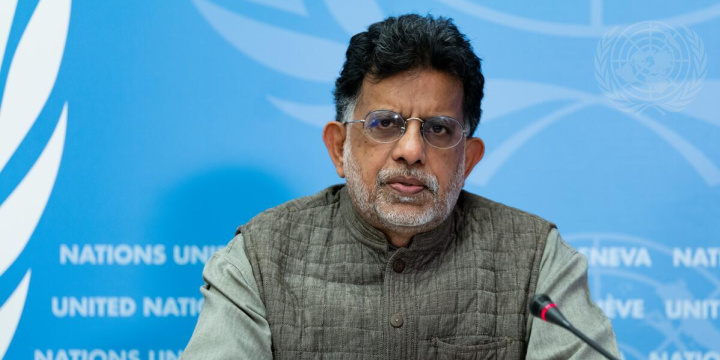Miloon Kothari, member of the United Nations Independent International Commission of Inquiry on the Occupied Palestinian Territory, including East Jerusalem, and Israel, briefs reporters on the first report of the Commission. UN Photo/Jean Marc Ferré
The Commission of Inquiry (COI), a controversial United Nations commission investigating Israel for nearly five years, has collapsed after all three of its members abruptly resigned days after the United States sanctioned a senior UN official over antisemitism.
Commission chair Navi Pillay resigned on July 8, citing health concerns and scheduling conflicts. Her fellow commissioners, Chris Sidoti and Miloon Kothari, followed suit days later. While none of the commissioners directly linked their resignations to the U.S. sanctions, the timing suggests mounting American pressure played a decisive role.
The resignations came just one day before the Trump administration announced sanctions on Francesca Albanese, the UN Special Rapporteur on the Palestinian territories. Albanese was sanctioned over what the State Department called a “pattern of antisemitic and inflammatory rhetoric.” She had previously claimed that the U.S. was controlled by a “Jewish lobby” and questioned Israel’s right to self-defense. The sanctions bar her from entering the U.S. and freeze any assets under American jurisdiction.
The resignations mark a major victory for critics who have long viewed the inquiry as biased and politically motivated.
Watchdog groups, including Geneva-based UN Watch, celebrated the swift collapse of the Commission of Inquiry (COI), which they say had long operated with an open mandate to target Israel. “This is a watershed moment of accountability,” said UN Watch Executive Director Hillel Neuer. “The COI was built on bias and sustained by hatred. Its fall is a victory for human rights, not a defeat.”
The COI had faced heavy criticism since its formation in 2021. In July 2022, Commissioner Miloon Kothari, made comments about the undue influence of a so-called “Jewish lobby” on the media, said the COI would “have to look at issues of settler colonialism.”
“Apartheid itself is a very useful paradigm, so we have a slightly different approach, but we will definitely get to it,” he added.
The Commission was established in 2021 year following the 11-day war between Israel and Gaza’s ruling Hamas group in May. COI is the first UN commission to ever be granted an indefinite period of investigation, which has drawn criticism from the US State Department, members of US Congress, and Jewish leaders across the world.
Following the resignations, Council President Jürg Lauber invited member states to nominate replacements by August 31. However, it is unclear whether the commission will be reconstituted or quietly shelved. UN Watch and other groups have urged the council to disband the COI entirely, calling it irreparably biased.
The post Scandal-Plagued UN Commission Disbands Amid Increasing US Pressure Against Anti-Israel International Organizations first appeared on Algemeiner.com.
Click this link for the original source of this article.
Author: Corey Walker
This content is courtesy of, and owned and copyrighted by, https://www.algemeiner.com and its author. This content is made available by use of the public RSS feed offered by the host site and is used for educational purposes only. If you are the author or represent the host site and would like this content removed now and in the future, please contact USSANews.com using the email address in the Contact page found in the website menu.








